Vintage 1946 Baekeland Painting Ny Uk High Society Murder Daughter Law Bakelite
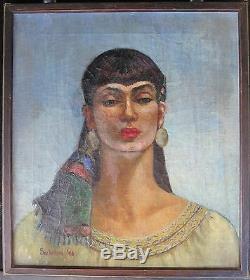

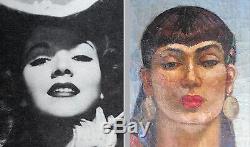
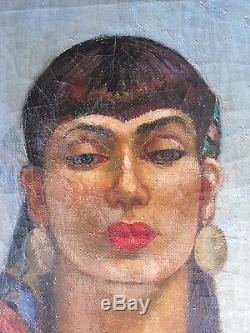
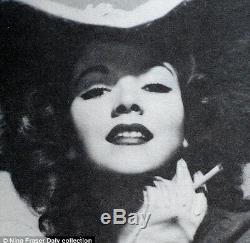
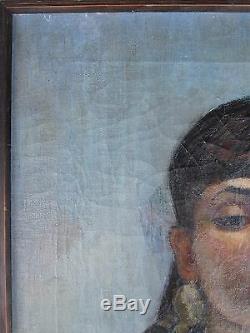
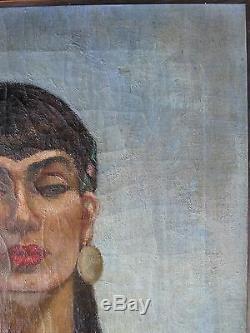
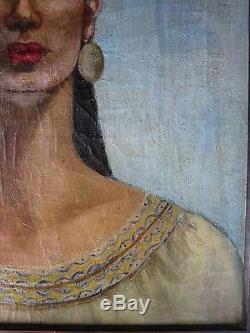
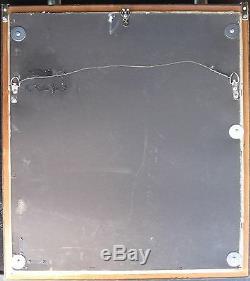
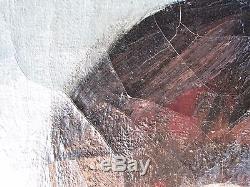
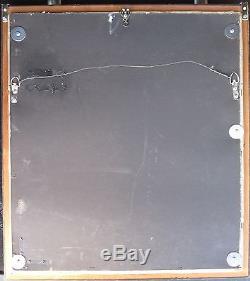
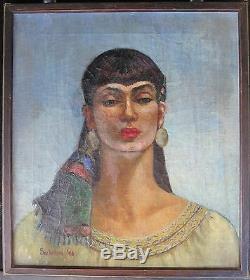

An original oil on canvas painting 1946 self-portrait by infamous Barbara Daly Baekeland (1922 - 1972) measuring approximately 18 x 16 inches in a larger frame. Baekeland was murdered by her son, listed as a painter at the time of her marrriage to the Brooke Baekeland, the son of Leo Baekeland, the invenetor of Bakelite.
Barbara Daly Baekeland (1922 November 17, 1972) was a wealthy American socialite. Who was murdered by her son, Anthony Baekeland. She was the ex-wife of Brooks Baekeland, who was the grandson of Leo Baekeland. She was murdered at her London. Home when her son Anthony stabbed her with a kitchen knife, killing her almost instantly.
Anthony was found at the scene of the crime, and later confessed to and was charged with her murder. Born and raised in Boston, her mother Nini had had a mental breakdown. A few years before Barbara was born.In 1932 when she was aged 10, her father Frank committed suicide from carbon monoxide. Poisoning from the exhaust of his car in the garage. Taking up residence in the Delmonico Hotel. As a young woman living in New York City, Barbera became a prominent socialite.
She was also hailed as one of New York's ten most beautiful girls, gaining her regular modelling contracts with Vogue. Her social status and beauty resulted in frequent invitations to high society parties, allowing her to date various wealthy admirers.
She also suffered mental health problems like her mother, and was a private patient of psychiatrist Foster Kennedy. With the actor Dana Andrews. Didn't lead to film stardom, but did lead to a friendship with fellow aspiring actress Cornelia "Dickie" Baekeland. She introduced Barbara to her younger brother Brooks, a trainee pilot with the Royal Canadian Air Force. After Barbara falsely told Brooks Baekeland that she was pregnant. The couple quickly married in California. At the time of the marriage, Barbara listed her profession as painter, while Brooks listed his as writer. After the marriage the couple set up home in a luxury apartment in the Upper East Side. Of New York, where they held extravagant dinner parties for their friends, who included Greta Garbo.Over time, Barbara became well-known to many for her unstable personality, rude outbursts, and bouts of severe depression. She also drank heavily, and both she and her husband participated in extramarital affairs. Barbara gave birth to a son, Anthony Baekeland, in August 1946.
From the summer of 1954 onwards, with Anthony aged eight, the Baekeland family led a nomadic seasonal existence, maintaining their home in New York while being mainly based in Europe. Renting houses and villas in London, Paris. And many parts of Italy.Barbara and Brooks continued to live extravagantly, entertain guests, and have affairs. From 1960 onwards, the family's main base was an apartment in Paris, where during one party Brooks met an English diplomat's daughter who was 15 years his junior.
After Brooks requested a divorce and Barbara subsequently tried to commit suicide. In 1967, at which time the family was based in both Switzerland. The 20-year-old Anthony met Jake Cooper, a bisexual.
Cooper introduced Anthony to various hallucinogenic. Drugs, which they travelled to Morocco. Anthony and Cooper also began an affair.
Baekeland was informed of this by her friend Barbara Curteis, she travelled by car to Spain to bring her son back to Switzerland. However, at the French border, Anthony was found not to have his passport. After the ensuing fracas, both Anthony and Barbara were arrested and placed in jail. Returning to Spain, Barbara accepted the extent of her son's relationship with Cooper, but preferred his developing relationship with a young Spanish girl, Sylvie. However, Sylvie then started an affair with Barbara's husband Brooks. After discovering the affair in February 1968, Barbara again tried to commit suicide. Brooks decided that he had had enough of Barbara's behaviour, and decided to pursue a divorce.This led Barbara to severe depression and a further suicide attempt, from which her friend Gloria Jones, wife of author James Jones. Brooks married Sylvie and had one child called Charles Baekeland. He later divorced and married again Susan Baekland. In 1969, Barbara met noted pop art. With whom she started an affair.
When later introduced to her son Anthony, Green was very unimpressed by his artistic capabilities. After six weeks, Green broke off the relationship, although Barbara was still obsessed with him.
In the snow wearing nothing but a Lynx. Fur coat to demand entry to his apartment. Barbara Baekeland had a complex and allegedly incestuous.
Relationship with her son, Anthony Baekeland, who was gay or bisexual. Her son by hiring prostitutes. To have sex with him. After this failed, while the pair were living in Majorca in the summer of 1968 following Barbara and Brooks's divorce.
Barbara was alleged to have manipulated or coerced. Her son into having sex with her. During his young adulthood, Anthony displayed increasingly regular signs of schizophrenia. Tendencies, and his erratic behavior caused concern among family friends. He was eventually diagnosed with schizophrenia. However, his father initially refused to allow him to be treated by psychiatrists, a profession he believed to be amoral. Over the years, Anthony and his mother had several violent arguments involving knives. In late July 1972, Anthony tried to throw his mother under the traffic outside her penthouse on Cadogan Square. She was only saved by his physical weakness, and the intervention of her friend Susan Guinness. Arrested Anthony for attempted murder. Barbara refused to press charges. Anthony was subsequently admitted to The Priory. But was released soon afterwards. Anthony then undertook sessions with a psychiatrist while living at home. The doctor became so concerned about Anthony's condition that on October 30, he warned Barbara that he was capable of murder. Barbara dismissed the doctor's assertion.Two weeks later, on November 17, 1972, Anthony murdered his mother by stabbing her with a kitchen knife, killing her almost instantly. She was 50 years of age at the time, and Anthony was 25. Police arrived and found Anthony at the scene of the crime. He later confessed to and was charged with her murder. Anthony was institutionalized at Broadmoor Hospital.
Prison until July 21, 1980 when, at the urging of a group of his friends, he was released. Upon his release, Anthony, now aged 33, flew directly to New York City. To stay with his 87-year-old maternal grandmother, Nina Daly.
Only six days after his release, on July 27, he attacked her with a kitchen knife, stabbing her eight times and breaking several bones. He was then arrested by the New York City Police Department. And sent to Rikers Island. After eight months of assessment by the psychiatric team at Rikers Island, he was expecting to be bailed out of prison at a court hearing on March 20, 1981. However, the case was adjourned by the judge due to a delay in the transfer of his medical records from England. The 2007 film Savage Grace. Is based on the life of Barbara and Anthony Baekeland, beginning with Antony's birth and following the family to the time of Anthony's arrest for the murder of his mother. The movie, starring Julianne Moore. Was based on the book of the same name. After the film opened, Baekeland's former lover Samuel Adams Green.Wrote an article pointing out elements in the film which were potentially misleading for those trying to read back to the reality inspiring it. Referring in particular to the menage-a-trois.
Scene, which depicted of Barbara, Anthony, and Sam Green in bed together having sex, he wrote. It is true that almost 40 years ago I did have an affair with Barbara, but I certainly never slept with her son... She started telling people she had had an incestuous relationship with her son as a way of'curing' him of homosexuality... But I don't believe she had sex with Tony. I think she simply enjoyed shocking people.
Green then embarked on legal action against the film makers, which was still unresolved at the time of his death. Fatal Seduction: How a society millionairess seduced her own son to'cure' him of being gay... And paid with her life.
Did not see her assailant until it was too late. Pushing open the front door of the house in Kensington Square, the upmarket London enclave where she was staying with a friend, Barbara Baekeland was about to take off her coat when the maniac jumped out and tried to grab her. Terrified, the 50-year-old society hostess twisted free and ran outside, back down the steps.
But she was too slow - and, as she stumbled towards the pavement, it was her hair that proved her downfall. Barbara Baekeland - The key revolver in a mad and malevolent family saga. Bonfire red, in contrast to her milkwhite skin, it had for years ensured that she always turned heads - in Hollywood, where she was once screen-tested as an actress, at society soirees in America and Europe, where she consorted with film stars and aristocrats, or in London, where she had recently acquired a luxurious penthouse flat in Chelsea. Now her attacker was using her most distinctive feature to try to kill her. Grabbing a fistful of her hair so that it tore and ripped at her scalp, he began dragging her into the road to throw her under a passing car. She tried to resist by clinging to the gate - so he began slamming it backwards and forwards on her fingers.Harder and harder, he smashed the metal against her hand, breaking her thumb in three places. Then, when she thought she could hold on no more, he suddenly changed his mind about how to finish her off. Letting go of the gate, he ran back into the house and reappeared with a carving knife, shouting that any woman who was near was going to'get it'. Barbara Baekeland's life might have ended there and then, had her friend Sue Guinness not arrived home that very moment.
Barbara Baekeland gave birth to Tony, who 26 years later would be responsible for her own exit from it. Leaving his victim lying dazed on the pavement, with a clump of hair missing from her head, the attacker fled back into the house and out through a rear door, disappearing into the exclusive residential streets beyond.
But it did not take long to track him down - for Barbara knew his identity only too well. The maniac who had almost killed her on that terrifying day in 1972 was her 26-year-old son, Tony. Although the police arrested him for attempted murder, she refused to press charges and Tony was admitted to the Priory, the private psychiatric hospital in South London, only to be released soon afterwards. Their dynasty was doomed by madness and debauchery.
Within a few months, he would strike again - and this time there would be no reprieve. Barbara would die at the hands of her own child in a savage murder at their Chelsea home that sent shockwaves through high society in both Britain and America. The death of Barbara Baekeland left only one question: not who had killed her, but why? That riddle is at the heart of Savage Grace, a Hollywood movie about the murder, starring Julianne Moore, which is released next month and is based on the book of the same name by Natalie Robins and Steven Aronson. Interviewing many of those closest to the family, Robins and Aronson paint a compelling portrait of a glittering dynasty doomed by madness, debauchery, drug abuse and black magic.
Most disturbing of all, they reveal how Tony Baekeland's act of matricide was preceded by another crime equally bewildering and shocking - Barbara Baekeland's sexual seduction of her son. Their fortune was made in America at the turn of the 20th century when Leo Baekeland, a Belgian chemist, invented Bakelite, the world's first plastic, which was used in everything from radios and records to artificial limbs and atomic bombs. His grandson Brooks Baekeland - Barbara's future husband - was an arrogant and aloof young man, with movie star looks. That means I need not please or seek to please anyone. An intellectual, he claimed to despise the ostentation and relentless partying of high society - so he could hardly have made a worse choice of wife than the red-headed beauty Barbara Daly.
Barbara, according to Brooks, had'mischief in the blood'. Her mother Nini had a breakdown a few years before Barbara was born and her father Frank killed himself in 1932 when she was only ten, gassing himself in the garage of their home near Boston with exhaust fumes from the family car. With her husband dead, Barbara's mother decided to marry her off to the richest man she could find.Hailed as one of New York's ten most beautiful girls, Barbara modelled for Vogue and Harper's Bazaar magazines, and flirted shamelessly with wealthy admirers. She was invited to Hollywood for a screen test and, although it came to nothing, made friends with Cornelia'Dickie' Baekeland, another aspiring actress, who decided to set her up with her younger brother, Brooks, a trainee pilot with the Royal Canadian Air Force. Barbara Baekeland is played by Julianne Moore in a new film about her life - Savage Grace, which is due to be released next month.
Brooks's dashing looks and wealth quickly convinced Barbara he was the man she was after. For his part, Brooks described Barbara as'remarkably beautiful and staggeringly self-assured'. They started sleeping together and she tricked him into marriage by claiming she was pregnant.Besides the non-existent baby, Barbara kept another secret from Brooks until it was too late for him to escape. Like her mother and father before her, she had mental problems - and, shortly before they met, had been a patient of a celebrated New York psychiatrist called Foster Kennedy.
Whatever Kennedy learned about Barbara during their sessions had clearly unnerved him, as Brooks would discover. Someone told me years later that when Foster Kennedy heard that I had married Barbara Daly, he said: God forfend that they have a child! God apparently ignored Kennedy's concerns for Barbara followed her phantom pregnancy with a real one. Barbara, according to husband Brooks, had'mischief in the blood', although he described her as described Barbara as'remarkably beautiful and staggeringly self-assured. In August 1946, she gave birth to Tony, bringing into the world the son who - in 26 years' time - would be responsible for her own exit from it.I'll sleep with the next woman who walks in. From the start, Barbara's mental fragility was obvious.
One friend recalled Brooks joking during a meal out one night that, for a million dollars, he would agree to sleep with the next woman who passed through the restaurant's revolving doors, regardless of her age or looks. Barbara said as they left, If that's the way you feel, I'll just go off with the first man who comes along in a car! And she dashed into the middle of the street, flagged down a car with four young men in it, jumped in and took off. A couple of hours later she came home, having evidently got rather cold feet.Barbara was very beautiful in those days so that was quite a crazy thing to do in New York City. Very crazy and very dangerous. Fascinated by the spirited madcap in their midst, the cream of American society began attending the Parisian-style salons which the Baekelands hosted in the enormous wood-panelled living room in their house on New York's affluent Upper East Side.
Attracting Salvador Dali, Tennessee Williams and Dylan Thomas among others, these soirees were renowned for being somewhat risque. At one gathering, the men hid behind a screen, hiding their faces and upper bodies, and removed their trousers while their wives were required to guess which bottom half belonged to which husband. My house was always buzzing with beautiful, silly, tipsy people,' said Brooks. The tension between husband and wife spilled over into frequent fights, with Barbara's mood swings seemingly exacerbated by the influence of the heavens.Friends who accompanied the Baekelands on a skiing holiday to Switzerland described how she stood out in the snow on the night of a full moon, keening and wailing like a demented creature. In the new film Savage Grace Barbara's character is played to perfection as a sadistic and mentally unstable woman who tricked everyone around her. The performance was repeated on a number of other occasions. It came on very suddenly and she would go round the bend,' said one astonished member of the party.
Brooks remembered his wife as'a wild animal, a flaming beautiful tigress' and described another trip where they ended up wrestling naked in a hotel bathroom because he would not take her to her favourite restaurant. I held Barbara down with my foot on her chest while she sank her strong, white teeth as deep as she could into my calf. It took at least a half hour for the adrenaline to burn out of her veins,' he said.
Oh, they would fight, they would.' said Peter Gable, a classmate of Tony's who often visited the Baekelands' house after school. I can remember hearing them. The only thing that appeared to unite the Baekelands was their determination to promote Tony as some sort of child prodigy, constantly showing off to their friends about everything he had written or drawn at school. It's rare to see a father revel in his son's sadism.They wanted the boy to be a genius,' said artist Yvonne Thomas. That's what struck me.
I felt uncomfortable with him because I felt. Felt he had to be something.One acquaintance remembered the Baekelands ordering their young son to read aloud from the Marquis de Sade's erotic writings. Another broke off contact with the couple after hearing Brooks's evident pride as he described how Tony had pulled the wings off a fly to see how it would affect its balance.
That kind of sadistic behaviour is quite common in children, but one seldom sees a father who thinks it is marvellous,' said the shocked friend. When Tony was eight - by which time his mother had climbed just about every rung of power and influence in New York - his parents found a new audience for his talents. Barbara wanted to conquer Europe and the family began a nomadic existence, renting villa after villa in fashionable resorts all over the Continent. In the entrance hall of whichever house they happened to be staying in, Barbara was careful to leave out a bowl full of visiting cards. All were artfully displayed so that others could see that the Duchesse de Croy or the Prince de Lippe had been ticked off her list of social acquisitions.
When they rented a villa at Cap d'Antibes in the South of France in 1955, their neighbours were Andre Dubonnet, grandson of the creator of the famous aperitif, and Freddy Heineken, the Dutch beer baron. Greta Garbo popped over for drinks.
Tony, meanwhile, was packed off to play on the beach with Princess Yasmin, the daughter of Rita Hayworth and the Aga Khan's son, Prince Aly Khan. Barbara was at once an intense, possessive, emotionally needy mother - and an entirely neglectful one. As the family travelled from one chic destination to another, in an endless round of idle summers, she and Brooks treated their son like a favourite toy, to be picked up and put down at whim. The Baekelands went out every single day on a yacht that they chartered from a local fisherman,' said a friend who spent one holiday with them. They just sat and drank masses of wine and jabbered and gossiped with this duchessa and that principessa and yet another contessa this-andthat.
Tony was left out of everything. A lonely and seemingly self-sufficient boy, Tony had inherited his parents' good looks, including his mother's red hair and radiant brown eyes. He charmed those who met him, but some saw indications of the turmoil to come. Nike Mylonas Hale met the Baekelands in Italy with her husband Bob when Tony was about 12. We saw him alone on the rocks playing with crabs, sort of pulling them apart,' she recalled. In hindsight it was an awfully creepy little episode but his parents didn't really pay much attention to Tony. Husband Brooks Baekeland is played by Stephen Dillane in Savage Grace - the film depicting their lives together. Another friend of the couple, Francine du Plessix Gray, was also worried by Tony's behaviour. She and her husband Cleve shared an Italian villa with the Baekelands in the summer of 1960 when Tony was 14. Tony had a pronounced stutter and psychiatrists say that can be an attention-getting device. But the only hint that there was something deeply wrong came halfway through the holiday. Our son Thaddeus had just been born so we had brought two months' supply of baby food with us and we suddenly noticed that there were these strange gaps in the rows of pots. A few days later the peasant girl who was looking after our son said to us It is Mr Tony. I have seen him do it.He comes in at night when the baby is asleep and steals the baby food. Maybe he wanted to identify with our baby because he'd never had any proper parenting from his own parents. Other, potentially more disturbing stories began spreading about Tony.
He would later tell psychiatrists that he'd had his first homosexual encounter at boarding school at the age of eight - and by 14 he was actively looking for sex with other males. It was an awfully creepy little episode. One friend who shared a cook with the Baekelands in New York was told that when his parents were away, he often picked up older boys on the streets and brought them home. For Brooks Baekeland, this confirmed what he, but not Barbara, had suspected for some time. Tony's homosexuality was a terrible shock to his mother, who fought against it with him, ferociously.
She simply could never accept it. Nor could Barbara reconcile herself to her husband's growing yearning for other women. The Baekelands were now using Paris as their main base, and in 1963 Brooks fell in love there with an English diplomat's daughter who was 15 years his junior. When he asked for a divorce, Barbara took an overdose. Although she survived, Brooks felt he couldn't leave her in case she did it again.
Faced with becoming a murderer for the sake of freedom, I gave up my girl,' he said. It was a pattern repeated throughout the rest of their marriage. Author Samuel Taylor recalled having dinner at the Baekelands' home in New York with the actress Jessica Tandy. Barbara said, Guess where I was at five this morning! " and she said, "At Bellevue Hospital, and she showed us the bandages on her wrists, very gay and charming about it.
Hoping to make Brooks realise that she was still attractive to other men, and so desire her more, Barbara began an affair with a Spanish physicist. This backfired when her husband offered her an annual allowance if she would divorce him and marry her lover.Instead, she announced that her relationship with the Spaniard was over because he couldn't park a car properly and she didn't like his feet. Although Brooks continued to have dalliances over the years, Barbara's suicide threats meant that none amounted to much until 1967 when she inadvertently set in train the events that would finally destroy their marriage. That year, Tony spent the summer with his parents in the Spanish resort of Cadaques where he met Jake Cooper, a handsome young Australian who was the lover of a woman called Erika Svenssen. Jake was like a devil,' said Svenssen. He had a power over people.
Tall and dark, with a silver earring, and known by his hangers-on as'Black Jake', Cooper lived in an abandoned farm with an entourage of hippies who were into magic mushrooms and other drugs. He had small bones sewn on to his vest which he referred to as'amulets' and it was rumoured that he practised black magic.
Some insisted that he had cast occult spells that had killed at least three people. The Australian's hold over Tony was witnessed by family friend Barbara Curteis while his mother was away in Switzerland. He fed Tony drugs and Tony became his thing, his creature. He went off to Morocco with Jake and they brought back belladonna [deadly nightshade, a highly dangerous hallucinogenic drug] and Tony ate the whole thing himself and disappeared under one's eyes to a blob of quivering jelly.
When Curteis phoned Tony's mother to warn her, she came back to Cadaques to rescue him and take him to Switzerland. They were stopped at the border because Tony didn't have his passport and in the ensuing fracas, with Barbara kicking and spitting at the immigration officials, both she and Tony were arrested and spent the night in jail.She made a remark I'll never forget, it has a sort of echoing horror for me,' said Barbara Curteis. She told me proudly that she'd said to Tony as they were being led away in handcuffs, Here you are, darling, at.
Tony's gay love for Black Jake wasn't the only budding relationship his mother was to destroy. He had begun seeing a young French girl called Sylvie, who was also on holiday in Cadaques.
Barbara was thrilled that he had a girlfriend at last and when he invited Sylvie for dinner to meet his parents, she immediately began pressing her to become Tony's wife - reminding her that he would one day be very rich. In the coming weeks, she went out of her way to invite Sylvie over whenever possible, but her scheming went terribly awry. Rather than marrying her son, Sylvie began an affair with her husband.Barbara did not discover that Sylvie and Brooks were seeing each other until the following February, at which point she attempted suicide again, taking an overdose of strong sedatives, washed down with vodka. This time Brooks did not come back to her. Perhaps realising that it was the only way to trump Barbara, Sylvie also took an overdose, leaving him to choose between the two brittle women. He eventually decided on Sylvie and told Barbara that this time he really wanted a divorce. Her next move may well have confirmed in his mind that he had made the right choice.
Before they separated, Barbara told Brooks, "You know, I could get Tony over his homosexuality if I just took him to bed, "' recalled Elizabeth Archer Baekeland, her sister-in-law. Brooks said, Don't you dare do that, Barbara!Barbara apparently ignored that warning. The effects on Tony's psyche were catastrophic. She and Tony spent the summer of 1969 in Majorca, drinking and smoking marijuana in a house loaned to them by the daughter of an Austrian archduke.
Afterwards, she remained convinced that she had done the right thing, even boasting about it whenever she got a chance. Barbara called me and told me that she had slept with Tony,' said her friend Alan Harrington.
I said to her I didn't think it was such a bad thing. I was trying to remove guilt but now that I think of it, there wasn't any expressed.
She was very honest about it - she said she had done it to break him of his homosexual tendencies,' remembered Bernard Pfriem, a painter who met Barbara on a cruise shortly afterwards. She talked about it as though it were a therapeutic act. Or the ultimate act of destructive self-indulgence by a spurned, narcissistic beauty?
Whatever the truth, the effects on Tony's already damaged psyche were to prove catastrophic. Later that summer, Brooks came to stay on Majorca with Sylvie, unaware that his wife and son were there. When Barbara discovered where they were staying, Tony began visiting them and his mental turmoil immediately became apparent. It was very uncomfortable, very hard,' recalled Sylvie. He left messages for Brooks in our flower pots. I found one - it said, Daddy, please Daddy, come back to Mummy, she's so unhappy. He acted like a little eight-year-old. One friend who visited Tony and Barbara at the archduke's house that summer was startled to see a broken chair in the flower beds. Barbara told her that Tony had thrown it there in a fit of rage. Later, the same friend saw a typewriter smashed and mangled on the steps leading down to the cellar. Once again Barbara explained that Tony had smashed it up when he was'upset about something'. The typewriter was one that Tony had used to write poetry, which he showed to his friend Alastair Reid.His poems had started out as gentle, unremarkable pieces of work but increasingly they were replaced by eerie and incoherent page-long ramblings. Barbara was a great smoother-over,' said Reid. But that summer I suddenly released there was a savage landscape inside Tony. Quite how savage would become apparent when Barbara went back to New York the following year and Tony joined her there soon afterwards.
During one dinner party, he disappeared to his room then came out totally undressed. He just streaked from one end of the apartment to the other,' recalled one of the guests. Tony's behaviour took a more worrying turn when he enrolled in a New York art school soon afterwards. Halfway through one lesson, the college registrar Sylvia Lochan was called to the classroom because Tony wasn't responding to anybody and seemed to be in a world of his own. While everyone else was painting a still life of flowers and fruit. Canvas depicted disturbing figures with blood dripping down their sides. It was obvious to me that he was very troubled, and, looking back, it's very surprising that he wasn't in some sort of hospital,' said Lochan.Dismissing this strange behaviour, Barbara remained convinced that her son was nothing more than a'misunderstood genius who was never meant to work and toil in this sick society'. She seemed oblivious to the possibility that Tony's troubles might stem from their increasingly unhealthy relationship.
I don't know what to do - I feel desperate. Barbara enrolled in a creative writing class and wrote a vivid account of a mother's sexual relationship with her son.
One night she invited some fellow students back to her apartment and they found the living room full of photographs she had taken of Tony. What struck me was the way the camera just dwelled on the beauty of this young man,' recalled one. They were not the sort of pictures a mother would normally take of a son.
Others who visited the Baekelands' home recalled seeing portraits painted by Tony, showing his mother decapitated and with serpents entwined around her neck. Soon even Barbara was forced to admit that there might be a serious problem when Tony turned up late one night, clearly delusional and highly agitated. Fearing that he might attack her, she arranged for him to be admitted-to a private psychiatric clinic but, although his medical records suggest that his prognosis seemed'poor', he was discharged after six weeks because Barbara could not afford his treatment. Brooks had cut her allowance and refused to fund Tony's care himself.
Rather than being mentally ill, he said his son was'a personification of evil' and dismissed psychiatrists as practitioners of mumbo-jumbo. Tony soon relapsed - beating Barbara unconscious with a heavy wooden walking cane one night and then, when her divorce lawyer tried to go to her aid, knocking him out, too. Your son is going to kill you, said the psychiatrist.
After that episode, he was diagnosed as having schizophrenia by psychiatrists at the local hospital who recommended that he should be sent to a private mental institution. But still his father refused to meet the costs.
Once again Tony was released back into Barbara's care, only to smash an egg across her face at a dinner party, threaten her with a knife and then attempt to choke her in front of the alarmed guests. In the final months of her life, many of which were spent in London, Tony's violent and unpredictable behaviour became steadily worse. During one fight he attempted to blind her by sticking a pen in her eye. On another occasion, a journalist named Clason Kyle accompanied Barbara home after dinner one evening. They were enjoying a nightcap when suddenly Tony appeared before them, wearing only shorts and brandishing a large kitchen knife. He ranted about the room, gesturing wildly, then he vanished as quickly as he had appeared,' recalled Kyle. The understatement of the century would be to say that I was startled. By August 1972, Tony was often to be found in catatonic trances, clutching himself and swaying to and fro. Barbara arranged for him to see Dr Lindsay Jacobs, a psychiatrist recommended by a friend. Jacobs confirmed that Tony was suffering from schizophrenia, made worse because Barbara had failed to make sure he took his prescribed medicines.Jacobs was extremely concerned for her safety. Your son is going to kill you,' he warned. I think you're at grave risk. I don't,' replied Barbara. But Jacobs was so worried that he phoned Chelsea police station.
I told them I thought something was going to happen over at 81 Cadogan Square and asked if they could put a guard there but they said that they were not really allowed to do much until something actually happened. Two days before Barbara was murdered, she invited her friend Sue Guinness around for lunch.
Having already witnessed the incident when Tony attempted to throw his mother under a car, Guinness was worried to find him looking as disturbed as ever. He had painted his shoes and all his clothes with gold stars, and he just sat there and rocked backwards and forwards with his arms crossed across his chest. During their lunch - the last time she saw her friend alive - Guinness urged her to be careful.
But Barbara dismissed her fears. As we will see on Monday, she could not have been more wrong. Sellers: Get your own map of past buyers. The item "VINTAGE 1946 BAEKELAND PAINTING NY UK HIGH SOCIETY MURDER DAUGHTER LAW BAKELITE" is in sale since Saturday, May 14, 2016. This item is in the category "Art\Paintings". The seller is "theprimitivefold" and is located in Lunenburg, Massachusetts. This item can be shipped worldwide.- Original/Reproduction: Original
- Listed By: Dealer or Reseller
- Signed?: Signed
- Medium: Oil
- Subject: Celebrities & Musicians
- Style: Realism
- Size Type/Largest Dimension: Medium (Up to 30in.)
- Date of Creation: 1900-1949
- Region of Origin: US

